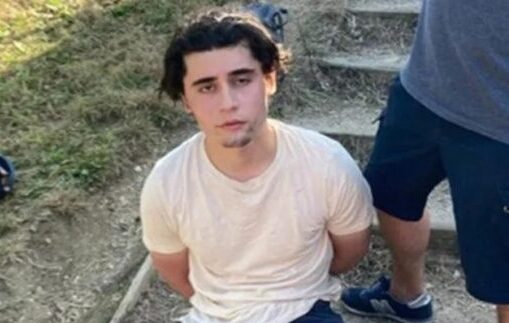Daniel Khalife has been sentenced to 14 years and three months in prison after escaping custody while awaiting trial for espionage on behalf of Iran.
Khalife, who joined the Army at 16 in September 2018, soon began transmitting confidential information—such as the identities of special forces soldiers—to Tehran.
Now 23, Khalife was charged in January 2023 and became the target of a nationwide manhunt after fleeing Wandsworth prison in August. He was apprehended in London following a 75-hour search.
When sentencing Khalife on Monday, Justice Cheema-Grubb remarked that he had shown “the potential to be an exemplary soldier” upon joining the Army, but ultimately proved to be “a reckless fool.”
“You are someone who craves attention and relished the infamy you garnered after escaping from prison,” the judge added.
Khalife, dressed in a black jumper, showed no reaction as he was escorted from the courtroom after the sentence.
The former soldier, convicted of espionage for Iran under the Official Secrets Act and the Terrorism Act, was found guilty in November after a trial at Woolwich Crown Court. Midway through the trial, he admitted to escaping from prison by attaching himself to the underside of a food delivery truck.
He was cleared of masterminding a bomb hoax at his RAF Stafford barracks in 2023, where three wired canisters were discovered.
Prosecutors claimed that Khalife had been “entrusted with the task of safeguarding national security,” but instead, he “misused his position to jeopardize it.”
In her sentencing comments, Justice Cheema-Grubb expressed regret that, soon after basic training, Khalife spent more than two years in communication with Iranian agents, a country whose interests conflict with those of the UK.
She noted that Khalife’s clearance had granted him access to an extensive array of sensitive material, and the confidentiality he owed had likely been emphasized during training.
The judge added that the precise details of the information Khalife shared with his handlers are unknown.
Shortly after enlisting, Khalife reached out to an individual associated with Iranian intelligence via Facebook. By August 2019, less than a year into his military service, Khalife was instructed to collect $2,000 concealed in a dog waste bag in Mill Hill Park, north London.
He later contacted MI6, claiming to have been paid by Iran for providing false intelligence and expressed a desire to become a “double agent.” He withheld information about his military background, and MI6 dismissed him.
During the trial, Khalife’s defense attorney characterized the plot as “incompetent” and likened it to “Scooby-Doo” rather than “007.”
A psychological assessment presented during the trial in 2023 diagnosed Khalife with Antisocial Personality Disorder and Narcissistic Personality Disorder. Other factors, including his age, were also taken into account.
While serving in the Army, including during a training exercise in the U.S., Khalife accumulated multiple photos of classified communication equipment, including computer screens displaying IP addresses. It remains unclear how many of these photos were sent to Iran.
Khalife compiled a list of 15 soldiers’ names, including those from special forces. Initially, he only had surnames and initials, but he exploited a flaw in the Army’s holiday system to gain access to first names, which he then photographed. These images were found on his phone.
Prosecutors believe that Khalife sent the names to Iran before deleting the evidence. He denied this, asserting that the information he passed along was either fabricated or insignificant. However, he is thought to have sent at least two classified documents, one concerning drones and another related to “Intelligence, Surveillance & Reconnaissance.”
The full extent of Khalife’s transmissions remains uncertain, as much of his correspondence was conducted via the encrypted messaging app Telegram.
After the verdict, Commander Dominic Murphy of the Metropolitan Police’s Counter Terrorism Command commented, “The threat to the UK posed by states like Iran is extremely serious, so for an Army soldier to share sensitive military information with them is highly dangerous and reckless.”
Three days after his prison escape, Khalife was caught by undercover officers on 9 September 2023, while riding a stolen bicycle along a canal towpath, just 11 miles from Wandsworth.
While on the run, Khalife tried to reach his Iranian contacts, sending a Telegram message that read, “I wait.” He did not receive a response.
At the sentencing hearing, it was revealed that the manhunt following Khalife’s escape cost the police over £250,000 in overtime, with more than 150 officers involved.
Upon his arrest, Khalife claimed that he had wanted to offer himself to UK security agencies, having previously contacted MI6 in 2019. He explained that he escaped because he was being held in a vulnerable prisoners’ unit, where most inmates were sex offenders, and he feared attacks from “terrorists” in Wandsworth. He believed that escaping would result in a transfer to the high-security Belmarsh prison.
After his escape, an audit uncovered 81 security lapses at Wandsworth prison, prompting “long overdue” improvements to CCTV systems, which had been malfunctioning for over a year. On the day of Khalife’s escape, nearly 40% of prison officers did not report for duty, although the Ministry of Justice insisted that the prison was adequately staffed.
ALSO READ FROM NIGERIAN TRIBUNE
US: Trump insists on reclaiming Panama Canal






